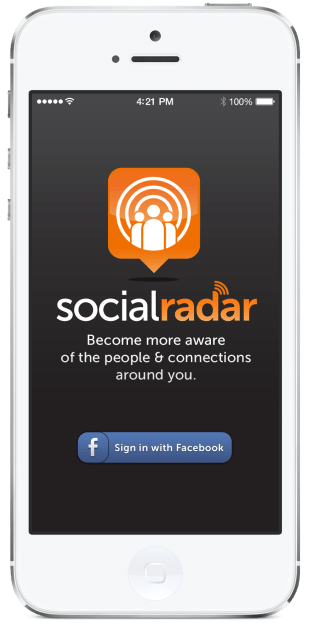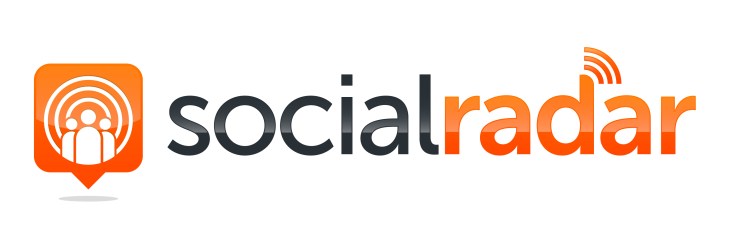If you thought the “ambient location” craze has passed, prepare to be surprised. A company called SocialRadar is announcing today that it has raised $12.75 million in Series A funding from NEA, Grotech Ventures, and others including Steve Case, Ted Leonsis, Dave Morin and Kevin Colleran for a mobile, location-based people discovery app arriving first on the iPhone.
What’s notable about the app, besides the fact that it’s arriving at a time when many have written off “people finders” as passé, is that the company’s founder and CEO is Michael Chasen, the former co-founder and CEO of Blackboard, who stepped down from his position at the company in late 2012, following its $1.64 billion exit to Providence Equity Partners in mid-2011.
Blackboard may not be the most beloved learning-management system, but it did establish itself as a leader in the space, which new edtech startups today hope to disrupt. And now, Chasen believes he can push SocialRadar to the top of the “people discovery” heap as well.
“One of the interesting things about Blackboard is that even though we were an enterprise software company, we really considered ourselves to be closer to the consumer,” Chasen explains. “I spent all my time on college campuses dealing with students and faculty to help put courses online.” While there, he noticed several interesting trends. Though only 56 percent of U.S. users have online profiles, on college campuses, it’s almost 95 percent. Smartphone penetration is around 60 percent in the U.S., but on college campuses, it’s over 90 percent, he says.
 Not only are the students more likely to carry these devices, they also use them in different ways. “They’re openly using their smartphones as location beacons and sharing their location with other people, as well as sharing their social information,” he says.
Not only are the students more likely to carry these devices, they also use them in different ways. “They’re openly using their smartphones as location beacons and sharing their location with other people, as well as sharing their social information,” he says.
But Chasen thought it was strange that although this is now the default behavior (at least within a particular demographic), there isn’t a simple way to just walk into a room, launch an app and find out who’s there and how you’re connected to them.
Of course, that’s not entirely true.
A number of startups including Highlight, Banjo, Sonar, and more have attacked the location-based, people discovery space with gusto over the past couple of years, with the movement really coming to a head at the annual SXSW event in Austin in 2012. Since then, however, many of the apps have struggled to find mainstream adoption. Some, like Glancee and Glassmap have sold. Others, like Kismet, have moved into new product categories. Intro pivoted.
Chasen insists that SocialRadar is different from that lot, though.
“I get that those applications use both location and sharing of information,” he says. One of his favorites in the group is Highlight, which he explains runs in the background and, when you’re near someone it thinks you’re interested in, it will give you an alert. “It is certainly a great app for meeting new people nearby that the Highlight algorithm thinks that you should meet, but it doesn’t give you the power to take out your phone when you walk into a room and see who’s around you,” says Chasen.
Meanwhile, an app like Sonar — which does in fact tell you which of your friends are near you (and how close by) — Chasen describes as just a “straight list of people,” accompanied by others who are friends of friends.
SocialRadar will instead focus on not just who’s nearby, but how you know them. For example, it would show you people who you work with, people you went to college with, and so on, not just names.
But the other big differentiator between SocialRadar and the other apps, which often mine publicly available check-in data to find those nearby connections or have disregarded real privacy concerns, is that SocialRadar is meant to offer users more control. Users can choose to share their location with all others, with friends only, or stay anonymous.
Users can also control how the app is run, choosing whether or not it’s background-enabled. That’s something that addresses one of the major pain points for end users of other location-based people finders like Highlight, which was said to have negative impacts on battery drain.
And SocialRadar will allow for custom alerts, letting you tell it when to bother you with notifications and which people or groups you’re interested in tracking. (E.g. when my best friend is nearby, when a fellow frat brother is in town, when my co-workers are at this event, etc.)
These differences, Chasen claims, will allow SocialRadar to succeed where others have stagnated. “There were hundreds of social networks before Facebook came out,” he says. “A lot of these other apps in the space I consider to be version one, toe-in-the-water. I wouldn’t even necessarily even put them in the same circle of competitors.”
Them’s fighting words.
SocialRadar, now a 10-person team based in Washington, D.C., is announcing its funding today, but the company was only formally founded eight weeks ago. However, the technology has been in development for much longer, Chasen says.
Still, it’s very early days. “We got office space seven or eight weeks ago, and I was literally building chairs in my office three weeks ago,” he says with a laugh. (Side note: at Blackboard, Chasen says they had so many people, he had a division of the company that built office furniture. How things have changed for him now.)
The iPhone version of SocialRadar will arrive in beta in a couple of weeks.
